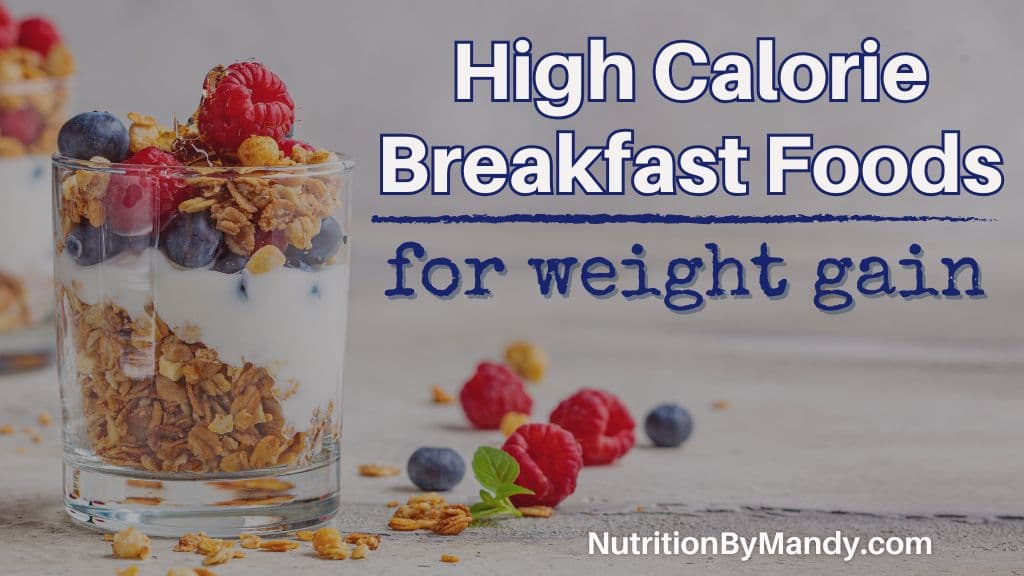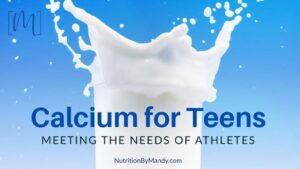Last Updated on February 12, 2025 by Mandy Tyler, M.Ed., RD, CSSD, LD
High Calorie Breakfast Foods for Weight Gain: Ideas for Athletes
Starting the day with a high-calorie breakfast is a great way to support athletes with achieving their weight gain goals.
Unfortunately, with busy morning schedules, breakfast is a meal often skipped in the rush to get out the door. Equipping athletes with a list of go-to high-calorie breakfast foods can be key to getting their day off on the right start.
Calorie-Dense Breakfast Foods for Athletes
A simple way to boost the caloric content of an athlete’s breakfast, is to build a meal that contains a variety of calorie-dense foods.
A food that is calorie-dense contains a high number of calories relative to its weight.
Adding calorie-dense foods to an athlete’s meal plan is a simple way to increase their calorie intake without having to greatly increase the amount of food they are consuming.
When selecting calorie-dense foods, athletes should choose those that also provide other nutrients, such as: protein, vitamins, and minerals.

High Calorie Breakfast Foods for Weight Gain in Athletes
Let’s explore a variety of high-calorie breakfast foods that athletes can enjoy to support their weight gain goals.
Whole Milk
Whole milk is a nutritious addition to an athlete’s breakfast, providing 13 essential nutrients. A 1-cup serving of milk provides ~150 calories and 8 grams of high-quality, complete protein (1).
When athletes desire to gain weight, drinking whole milk is a great way to add calories, protein, calcium, and Vitamin D to their morning meal (1).
I recommend that athletes consider trying an ultra-filtered, whole milk, such as Fairlife®, with their breakfast. Ultra-filtered, high-protein milks are filtered to remove the lactose and contain a concentrated protein and calcium content.
To provide a comparison, a cup of ultra-filtered milk has ~13 grams of protein (2), while a cup of regular cow’s milk has 8 grams of protein (1).
Thus, drinking ultra-filtered, whole milk is a great way for athletes to add calories and protein to their breakfast.

Whole Milk Greek Yogurt: Protein-Rich, High Calorie Breakfast Food
Greek yogurt made with whole milk is another great way to add both calories and protein to an athlete’s breakfast.
A 1-cup serving of whole milk Greek yogurt provides ~230 calories and 21 grams of protein (3). In comparison, a 1-cup serving of Greek yogurt made with nonfat milk only provides ~145 calories (4).
A fruit and Greek yogurt parfait is a great high calorie option that athletes can enjoy with their breakfast.
Topping the parfait with granola and chopped nuts will add a nice crunch to the parfait and further boost the calorie content.
In addition to a parfait, athletes can use Greek yogurt in a smoothie or when making protein overnight oats to boost the calorie and protein content of the recipes.
Cottage Cheese
Similar to Greek yogurt, selecting a cottage cheese made with whole milk is another great high calorie, protein-rich breakfast food for athletes.
A 1-cup serving of cottage cheese (4% milkfat) provides 240 calories and 28 grams of protein (5).
At breakfast, athletes can whisk cottage cheese into their eggs before they scramble them to add calories and protein. The cottage cheese will also give the eggs a soft, creamy texture
Cottage cheese topped with fruit, granola, nuts, and/or seeds can be a high calorie, nutrient-rich addition to an athlete’s breakfast.
If athletes do not like the texture of cottage cheese, they can blend it into their fruit smoothies. Cottage cheese will make the smoothie extra creamy without altering the flavor.
Dried Fruit
Dried fruit is another calorie-dense breakfast food option for athletes. It is a nutritious way for athletes to add carbohydrates, fiber, vitamins, minerals, and phytochemicals to their morning meal (6).
To provide an idea, the calorie content of some common types of dried fruit is listed below:
| Dried Fruit | Serving Size | Calories |
| Raisins | 0.25 cup | 120 |
| Dried cranberries | 0.25 cup | 130 |
| Dried mango | 1 cup | 510 |
| Dried pineapple | 1 cup | 555 |
| Medjool date | 1 date (pitted) | 67 |
Here are some ideas for how athletes can add dried fruit to a high calorie breakfast:
- Stir into whole grain breakfast cereal
- Use as a topping on oatmeal
- Add to cottage cheese
- Include as part of a breakfast trail mix, including nuts, dried fruit, and breakfast cereal
Granola: High Calorie Breakfast Cereal
Granola can be a tasty way for athletes to add calories to their breakfast. Typically, granola is made with ingredients such as oats, nuts, dried fruit, seeds, honey, maple syrup, and oil. Together these ingredients make granola an extremely calorie-dense option.
A 0.5 cup serving of granola can easily provide over 200 calories (7), depending upon the kind used.
Ideas for ways that athletes can enjoy granola with a high calorie breakfast include:
- Prepare a Greek yogurt, berries, and granola parfait
- Add as a topping on overnight oats, an acai bowl, or smoothie bowl
- Enjoy a large bowl of granola with whole milk
- Stir granola into your favorite breakfast cereal
- Include as an ingredient in a cottage cheese with fruit bowl

Bagels: High Calorie Breakfast Food Option
Enjoying a bagel with breakfast is a simple way for athletes to boost the calorie content of their morning meal. A large deli-style bagel can contain over 320 calories depending on the flavor and brand (8).
To provide a comparison, a regular slice of bread provides ~80 calories (9). Thus, eating a large bagel at breakfast provides the carbohydrate equivalent of ~4 slices of bread.
Athletes who need a quick breakfast on-the-go can use a bagel to make a breakfast sandwich. One of my favorite combinations for athletes is peanut butter, sliced banana, and honey on a bagel.
Another high calorie breakfast idea is to use a bagel to make avocado toast. Simply top a large bagel with sliced avocado, a fried egg, and a drizzle of olive oil.
I suggest athletes enjoy their breakfast bagel with a glass of whole milk as well as a fruit and yogurt parfait. This high calorie, nutrient-rich breakfast is a great way for athletes to start their day.
Pro Tip: Bagels are high in carbohydrates. Thus, they can be a great option for athletes to enjoy before morning practice to provide energy for their workout.
Nuts and Nut Butter
Nuts and nut butters contain protein, healthy unsaturated fats, vitamins, minerals, and phytochemicals making them a healthy addition to an athlete’s breakfast (6).
In addition, nuts and nut butters are calorie-dense, making them an easy option for athletes trying to gain weight.
Different types of nuts provide different nutritional benefits. Thus, I encourage athletes to include a variety of nuts and types of nut butters in their sports nutrition meal plan.
When choosing a nut butter, athletes should select a product that has limited added ingredients, such as hydrogenated oils.
At breakfast, athletes can add walnuts, chopped pecans, or sliced almonds to their oatmeal, breakfast cereal, or Greek yogurt parfait.
Nut butters make a great topping for a bagel or pancakes, can be blended into a smoothie, or stirred into oatmeal for added calories and flavor.
Pro Tip: Athletes who have a nut allergy, can consider trying SunButter® spread. Sunbutter® products are prepared with sunflower seeds and are nut-allergen free.

Seeds: Nutritious Addition to a High Calorie Breakfast
In addition to nuts, seeds can be a nutrient-rich addition to a high calorie breakfast for athletes. They provide protein, fiber, and unsaturated fat, as well as a variety of vitamins, minerals, and antioxidants (10).
Since seeds are calorie-dense, even adding a small amount can boost the calorie content of an athlete’s breakfast. To provide an example, a 1-ounce serving of chia seeds provides 138 calories (11).
Ideas for ways athletes can add seeds to their high calorie breakfast include:
- Add chia seeds or ground flaxseeds to fruit smoothies and overnight oats
- Sprinkle pumpkin seeds or sunflower seeds as a topping on cottage cheese
- Include seeds in your favorite homemade granola recipes
- Enjoy chia seed pudding as part of a healthy breakfast
- Top your bowl of breakfast cereal with a variety of seeds
- Add ground flaxseeds into breakfast muffins and pancake mixes
Avocado: Nutrient-Rich, High Calorie Breakfast Food
Avocados are a nutrient-rich way for athletes to add calories, unsaturated fats, fiber, vitamins, and minerals to their breakfast.
One medium avocado (201 g) provides 322 calories and 30 grams of fat (12). The majority of fat found in avocados is monounsaturated fat, a type of healthy, unsaturated fat.
In addition, avocados also provide B Vitamins, Vitamin C, potassium, folate, and magnesium, making them a nutritious addition to an athlete’s breakfast (12).
As an added benefit, a medium avocado provides ~14 grams of fiber (12). Thus, avocados are a nutritious way for athletes to increase the fiber content of their breakfast.
Athletes can add sliced avocados to a breakfast burrito, enjoy avocado toast made on a whole grain bagel, or blend avocado into a high-calorie smoothie to enjoy with their morning meal.

Olive Oil
Similar to avocados, olive oil is rich in healthy monounsaturated fats. Olive oil also contains polyphenols, which have anti-inflammatory and antioxidant effects in the body (13).
A 1-Tablespoon serving of olive oil provides 120 calories (14), making it a simple way for athletes to boost the calorie content of their breakfast.
Athletes can enjoy olive oil drizzled on top of their avocado toast at breakfast. In addition, they can use olive oil when preparing breakfast potatoes, scrambled eggs, or omelets.
High Calorie Breakfast Foods for Weight Gain: Ideas for Athletes
You are now set with ideas for high calorie breakfast foods that athletes can enjoy to support their weight gain goals.
I encourage athletes to include these foods on their grocery lists so they have the items available for breakfast throughout the week.
For additional meal planning tips, check out my blog with grab-and-go lunch ideas for busy athletes.
Join the Nutrition By Mandy Email List & Get a Free Weekly Meal Planner Template
Click HERE to join the Nutrition By Mandy e-mail list. When you join you will receive a free weekly meal planner template to download and plan out your meals for the week.
About the Author
Mandy Tyler is a Sports Dietitian Nutritionist in the San Antonio, TX area. She is a Registered and Licensed Dietitian, a Board-Certified Specialist in Sports Dietetics, a Licensed Athletic Trainer, and is a Certified Exercise Physiologist through the American College of Sports Medicine. Mandy has experience working with athletes at the high school, collegiate, and professional levels. She believes the key to reaching one’s full potential, both in everyday life and in sports performance, relies on a healthy nutritional foundation.

If you are looking to take your performance to the next level, make sure to check out my new Sports Nutrition Game Day Guide. This downloadable guide is written to help athletes develop an individualized plan to achieve peak performance on game day.





